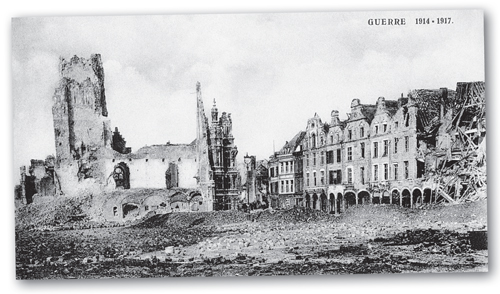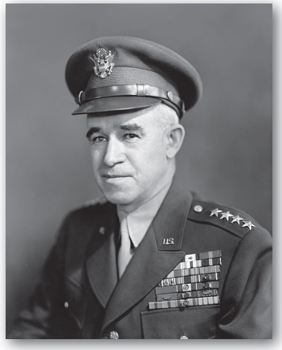Plymouth (21 page)
Authors: Laura Quigley


The devastation caused at the Front by the new artillery of the twentieth century is shown starkly in this postcard of Arras.
Many German transports got stuck on the road, and Colwill describes how four machine-gunners did their work so well that not a single German in the transports was left to tell the tale of what had happened to the rest of them.
For many months, reinforcements were non-existent and the Devons’ forces depleted. On 29 March 1918, at 3 a.m., things looked very bleak for the Devons indeed. The town of Monsel was taken by the Germans, and as the Devons waited for their chance to strike they were appalled by the line of desperate refugees leaving the town, many pushing prams containing sleeping infants, the women crying, going they knew not where. It seemed that nothing could prevent the Germans taking Amiens, and little short of a miracle would save Paris.
At Castel, the German ‘barrage was terrible. There was no a gap in it. Machine gun and rifle fire increased in intensity and the wood was full of smoke, flying tree trunks and clouds of earth thrown up by the bursting shells. It was a veritable hell.’
In May 1918, at the Battle of the Bois des Buttes, the 2nd Devons – long since robbed of their regular soldiers through attrition – went down to hopeless odds, with Colonel Anderson-Morshead of the old Plymouth merchant family dying with them, revolver in one hand and hunting crop in the other.
Colonel Anderson-Morshead told the men that their last chance of escape had gone. The bridge ahead of them was taken, the village of Pontavert swarming with the enemy. ‘Your job for England, men,’ the Colonel said, ‘is to hold the blighters up as much as you can, to give our troops a chance on the other side of the river. There is no hope of relief. We have to fight to the last.’
As the commanding officer stoically made his notes with high explosives falling about his ears, less than fifty men managed to survive to cross the river, many dying later of their wounds.
1939-1945
THE FALLEN
D
ESPITE THE ‘WAR
to end all wars’, in 1939 Britain again found itself fighting the Germans. On the night of 20 March 1941, as winter was coming to an end, German bomber groups of the 3rd Air Fleet, flying from captured air fields in Northern France, attacked and destroyed Plymouth city centre. Within twenty-four hours, the aerial assault intensified, and Plymouth became the worst blitzed city of its size in the UK. Plymouth was left a desolate ruin. For Plymouth, the Second World War would be yet another ‘end of the world’.
![]()
A young Nazi airman bailed out of his plane during an air raid in 1943 and landed in Lisson Grove in Mutley Plain, where he was captured by Mr Doidge, the warden. The censors kept one element from the press. While leading the fallen airman through Plymouth, Mr Doidge had used an old piece of string to bind the airman’s hands. The censors feared the binding of a prisoner of war’s hands would cause an international outcry, so carefully kept it quiet.
![]()
Night after night in March and April 1941 the German bombs rained down, leaving no street untouched, no family unaffected. Whole families were wiped out in an instant. Thousands left Plymouth each night for the safety of the Dartmoor hills, returning again each morning to work. Thousands more were evacuated, but many stayed, huddling terrified in damp and cramped air-raid shelters as each bombing raid took its toll on the city around them. On 22 April 1941 an air-raid shelter behind the Technical School in Devonport received a direct hit. During repairs three bodies were discovered, those of Olive Spracklan, Phyllis Shortman and Edwin Brazier.
The air-raid shelter at Portland Square was just 1.9m high and 1.4m wide; standing room only for the local families seeking shelter. On 23 April 1941 the shelter took a direct hit and over seventy people lost their lives. The Mary Newman Student Hall of Residence was built close to the site and Plymouth University students have reported feelings of fear and of being watched, ice-cold blasts of air and the sound of disembodied voices.
![]()
Arthur Martin of Peverell was killed instantly in an explosion at Devonport Docks in 1945. He was working as a burner on the aircraft carrier
Atheling
, and had switched on his torch as he prepared to cut a plate. The torch was faulty and was leaking petrol, and a great jet of flame erupted up the side of the ship. Thick pillars of smoke could be seen all over the dockyard as the police and rescue services rushed to the scene.
![]()
Running among the explosions and the fires, the City’s Civil Defence Corps maintained communications between the ARP Command Posts, co-ordinating rescues and the fire services, who were desperately short of water. The Corps were a brave band of mainly youngsters, boys barely in their teens, dashing from one emergency to another as streets were devastated around them. Children in wartime Plymouth grew up quickly. The home of one of the boys, David Gibbs, just fifteen, received a direct hit. His family were all killed, but he was never told the terrible news; he was out on the streets, delivering official messages, when an exploding bomb killed him too.
Plymothians remained stoic in the midst of the terror and devastation. One man who grew up in Plymouth during the bombing described how his mother always seemed to cope and never to complain – and then one morning she woke up and her hair had gone completely white.
On 28 April 1941 a mass burial was held in Efford Cemetery for the victims of the Blitz. The service was led jointly by the Bishops of Plymouth and Exeter, the Roman Catholic Bishop of Plymouth and representatives of the Salvation Army, and was attended by all the armed services. The
Western Morning News
reported: ‘Here, in a setting of beauty and peace, which looks out over a wonderful panorama of the Devon hills, this company of Plymothians who were called upon to make the supreme sacrifice rest together, men, women and children.’
In June 1944 Plymouth was one of the principal staging posts for the Normandy landings, the invasion of France that would eventually end the Second World War in Europe. Plymouth Sound was bursting with ships, and the city packed with thousands of uniformed men, many from America, including General Omar Bradley and the 1st US Army, training at nearby Slapton Sands for their attempt to take the French beaches that would be code-named Omaha and Utah. Vast numbers of tanks and guns were stored around the city, and there was the constant buzz of training and preparation.

General Omar Bradley, who trained his men for D-Day at Slapton Sands. (LC-DIG-hec-21734)
Within the storage vaults and battlements of Crownhill Fort, originally built to defend Plymouth from the French in the 1800s, soldiers from both world wars scrawled their names on the whitewashed walls, poignant reminders of their presence in Plymouth. The Fort became the training ground for many regiments in the 1940s, including the 111th Field Artillery Battalion, comprising US soldiers recruited into the Virginia Army National Guard.
![]()
An unexploded 70kg bomb was discovered in 2010 by builders in Notte Street, a nasty reminder of the bombing raids of the Second World War. The bomb was transported with great care through the city, under police escort, towards Millbay Docks. All the shop frontages had to be cleared in case the bomb accidentally detonated. The bomb was then transferred onto the bomb disposal unit’s diving boat and carried to a few miles off Cawsands, where it was exploded in the water. A massive 15ft jet of spray ended the operation.
![]()